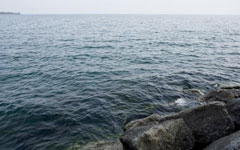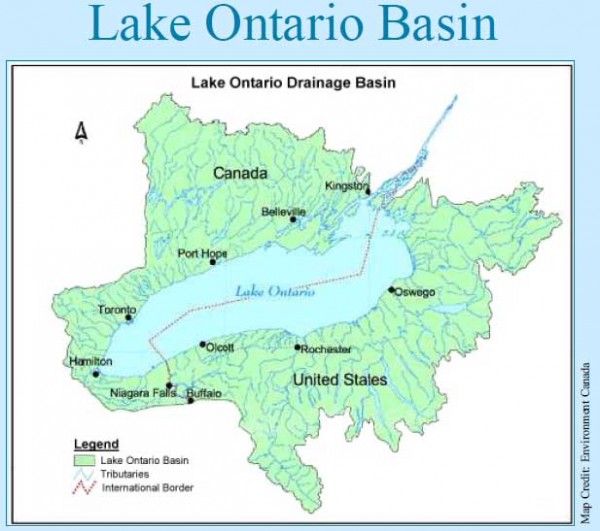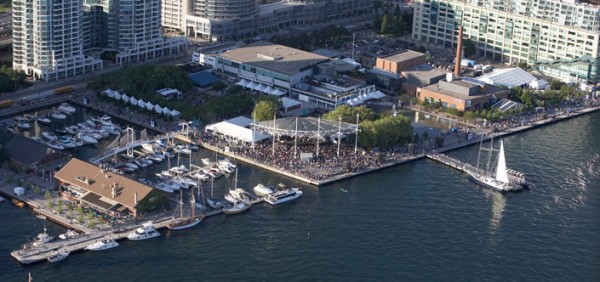
Did you know that although Lake Ontario is the smallest of the Great Lakes, its drainage basin is the most densely populated of all the Great Lakes basins?

Let’s have a look at the following interesting timeline (1960’s – 1990’s, 2011) of Lake Ontario’s ecosystem events in order to better understand how “Lake Ontario is among the most stressed ecosystems in the Great Lakes system”:
- late 1960’s
- fish populations were decimated
- beaches were fouled
- chemical toxins, such as DDT, were impairing reproduction of waterfowl
- 1972
- Canada and US adopted the Great Lakes Water Quality Agreement which committed both countries to restoring and enhancing the water quality of the Great Lakes
- aggressive programs were begun to control sea lamprey, rehabilitate lake trout and developed major hatchery supported fisheries for pacific salmon, brown trout and rainbow trout
- end of 1980’s’
- Lake Ontario was on the road to recovery because
- water quality inproved,
- levels of toxic contaminants in fish decreased
- sport fisheries were more productive than ever
- however, unfavourable ecological changes occurred at all levels of Lake Ontario food chain, including a reduction in available nutrients, zooplankton, alewife and smelt; alewife and smelt are the principal foods of salmon, trout and other top predators
- 1990’s
- level of fishing stocks was higher than could be supported by the available prey
- stocking was reduced in 1993 – 1994 with
- a target to eventually decrease the demand on prey fish by 45 to 50 percent, and expecting a better balance in pedator demand with prey supply over the longer term
- 2011
- Probing Lake Ontario’s Nearshore Ecosystem has found that a new aquatic invasive species, commonly known as the bloody red shrimp (a large zooplankton which can sometimes be spotted in red swarms near breakwalls, jetties and piers) has found its way from Eastern Europe (Azov, Black and Caspian seas) to the nearshore waters of Lake Ontario where it may compete with larval and juvenile fish for food
- Department of Fisheries and Oceans’s (DFO’s) Great Lakes Laboratory for Fisheries and Aquatic Science are:
- evaluating how nearshore areas contribute to the health and productivity of the whole lake;
- assessing the sensitivity of this zone to the cumulative effects of multiple stressors including human development and climate change; and
- predict how nearshore habitats will respond to projected future conditions.
We need to continuously and “carefully watch Lake Ontario ecosystem at all levels – from nutrients to fish to man.”

Harbourfront Centre Presents
Lake Ontario Evenings: Beaches Edition
FREE
Tuesday, July 19, 2011
5:45pm: Pre-Reception
in the Marilyn Brewer Community Space
6:00PM – 8:00PM: Speaker’s Series
8:00 – 10:00pm: Post-Event Reception
Studio Theatre
York Quay Centre, 235 Queens Quay West
Toronto, Ontario, Canada
map
“Lake Ontario is among the most stressed ecosystems in the Great Lakes system.
With a major urban area located on its shores, what happens – or doesn’t happen – in the Greater Toronto Area has serious consequences on the future health of the lake and its residents.
This speaker’s series has helped engage individuals and community groups in learning more about the issues being faced by our Great Lakes, and participants are provided with examples of successful restoration projects and opportunities for action.
During 2010, three Lake Ontario Evenings events – focusing on the shoreline, contaminants and biodiversity – were all well attended, showing the public’s abiding interest for more information on lake issues.
Come out and hear what Dr. David McKeown, Medical Officer of Health for the City of Toronto Environmental Defence, and others has to say about the current state of Lake Ontario.
There will be a pre-reception held in the Marilyn Brewer Community Space at 5:45pm. A post-event reception will continue in the Marilyn Brewer Community Space following the end of the speakers’ series from 8-10pm.”
Please click here for directions and parking info.
Contact Info:
For general inquiries regarding events, programs, site directions and services:
Information Hotline | 416-973-4000
eMail | info@harbourfrontcentre.com
Administrative Offices
235 Queens Quay West,
Toronto, Ontario
Canada M5J 2G8
Phone | 416-973-4600
Fax | 416-973-6055
Enjoy!
You may also want to know:
